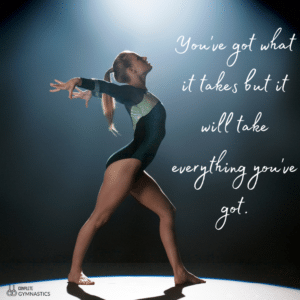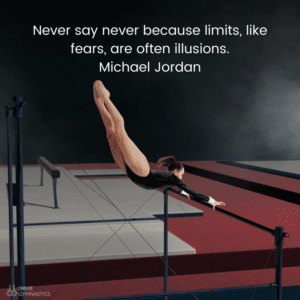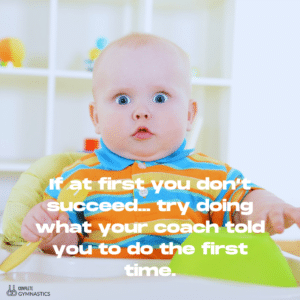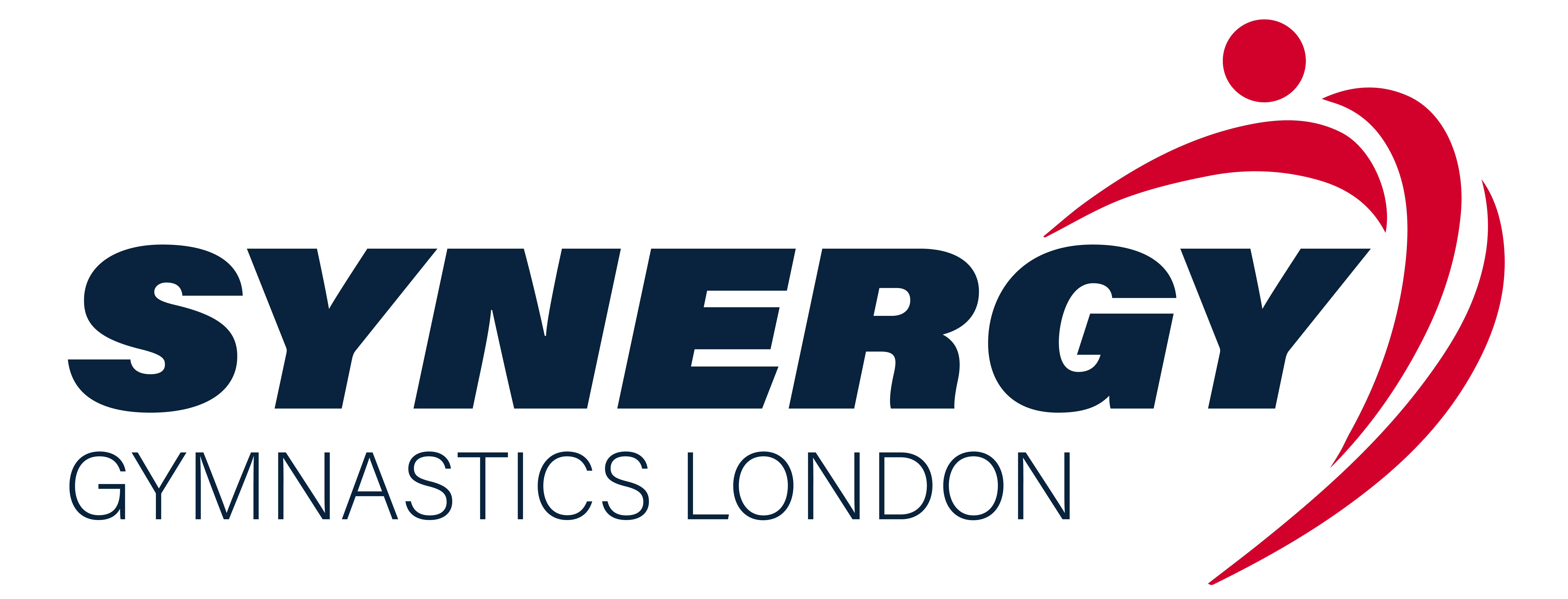
Simone Biles choice to withdraw part way through the 2020 Tokyo Olympics had many people wondering ‘what is a mental block in gymnastics?’
Attitudes towards this important topic have begun to shift and this article explores them in depth along with the strategies needed to overcome and even prevent mental blocks occurring.
Let’s get started.
Introduction
In the world of gymnastics, where physical prowess and grace are celebrated, the significance of mental strength often flies under the radar. Yet, it is this very mental fortitude that distinguishes the great gymnasts from the good ones.
The ability to focus, maintain composure under pressure, and overcome fear is as essential as executing a flawless routine. Gymnastics is not just a test of physical ability; it’s equally a mental challenge.
Amidst this interplay of mind and muscle, one encounters the phenomenon known as a ‘mental block.’ This term, perhaps familiar in everyday conversation, takes on a profound meaning in gymnastics.
A mental block is a psychological hurdle that prevents an athlete from performing a skill that they have previously mastered. It’s not just about losing technique; it’s about battling an invisible force that hinders the mind-body coordination essential in gymnastics.
This block can manifest in various forms – most usually in gymnastics, the gymnast cannot even attempt a previously straightforward skill.
The reality and severity of mental blocks in gymnastics were thrust into the global spotlight by the high-profile case of Simone Biles during the 2020 Tokyo Olympic Games. Biles, an icon in the sport and a role model for gymnasts worldwide made the brave decision to withdraw from the final competition, citing mental health concerns and a phenomenon known as the ‘twisties’ – a disorienting sensation where gymnasts lose track of their positioning mid-air.
Her decision, courageous and unprecedented, opened a floodgate of discussions about the mental challenges athletes face, especially in a sport as demanding as gymnastics.
As we delve deeper into understanding what constitutes a mental block, how it affects gymnasts, and ways to overcome it, we keep in mind the courageous example set by Simone Biles. Her experience serves not only as a testament to the realities of mental blocks in gymnastics but also as a beacon of awareness and change in addressing mental health in sports.
Understanding Mental Blocks
In the realm of gymnastics, a mental block is a psychological impediment that disrupts a gymnast’s ability to perform skills that were once within their capability. This phenomenon goes beyond the occasional lapse in performance or a bad day at training; it represents a significant barrier where the mind unconsciously prevents the body from executing a movement, often out of fear or anxiety.
These blocks can affect gymnasts at all levels, from beginners learning new skills to elite athletes perfecting their routines.
Traditionally, gymnastics has been a sport where coaches have been unsympathetic towards athletes having mental blocks.
Treatment by certain coaches was often harsh and even abusive. Gymnasts could be forced to repeat skills they were having blocks over and this caused long-term harm to their mental well-being.

This lack of understanding from many coaches has gradually been improving in recent years however, it is fair to say there are probably many in the sport still lacking a real understanding of mental blocks.
Common Causes of Mental Blocks in Gymnastics:
- Pressure and Stress of Competition: The high-stakes environment of gymnastic competitions can be a breeding ground for mental blocks. Athletes often face immense pressure to perform perfectly, not just from external sources like coaches and audiences, but also from their own internal expectations. This intense pressure can lead to performance anxiety, where the fear of failure becomes debilitating, causing the gymnast to freeze or falter when performing a skill they have done countless times.
- Past Injuries or Fear of Injury: Gymnastics, being a sport that demands a high level of physicality, carries a risk of injury. Athletes who have previously experienced injuries may develop a mental block when attempting the same skill that caused the injury. This block is a protective mechanism, rooted in fear, preventing the gymnast from fully committing to the movement. The fear of re-injury or the memory of the pain and setback can be a powerful mental barrier.
- Burnout and Mental Fatigue: The rigorous training schedules and the constant push for perfection can lead to burnout and mental exhaustion among gymnasts. When an athlete is mentally fatigued, their focus, motivation, and confidence can wane, making them more susceptible to mental blocks. The mind, tired from constant stress and pressure, may resist the demands of high-level performance, manifesting in the form of a block.
Psychological and Physical Effects on Gymnasts:
Mental blocks in gymnastics have both psychological and physical repercussions. Psychologically, they can lead to a decrease in self-confidence, increased anxiety, and frustration, and in severe cases, can contribute to the development of mental health issues like depression.
Physically, these blocks can result in a decrease in performance level, inconsistency in skill execution, and an increased risk of injury due to hesitation or improper technique.
Understanding mental blocks in gymnastics requires an acknowledgment of their complex nature. They are not simply a matter of ‘mind over matter’; instead, they are deeply embedded in the psychological fabric of the athlete.
Addressing them requires a nuanced approach that considers the mental and emotional well-being of the gymnast as much as their physical skill and prowess.
Identifying Mental Blocks in Gymnasts
Recognizing mental blocks in gymnasts is crucial for timely intervention and support. These blocks, often invisible to the external eye, manifest through various signs and symptoms that coaches, parents, and even the athletes themselves need to be aware of.
Early identification can prevent these blocks from escalating into more significant mental health issues or causing a decline in performance and enjoyment of the sport.
Signs and Symptoms to Look Out For:
- Inconsistent Performance: One of the most telling signs of a mental block is a sudden and unexplained inconsistency in performance. A gymnast who has consistently performed a skill with ease may suddenly start struggling with it, without any apparent physical reason. This inconsistency might fluctuate, with the athlete being able to perform the skill one day and then losing the ability the next.
- Avoidance of Certain Skills or Routines: If a gymnast starts avoiding specific skills or routines they used to perform, it might indicate a mental block. This avoidance behavior can manifest as a reluctance to practice certain elements, making excuses to skip them, or expressing undue distress when faced with those specific skills.
- Increased Anxiety or Stress Levels: Mental blocks are often accompanied by heightened levels of anxiety or stress, particularly when the athlete is faced with a problematic skill or routine. This can be observed in changes in behavior, such as increased nervousness, irritability, or a defeatist attitude toward training and competition.
The Importance of Early Recognition
The early identification of mental blocks is vital for several reasons. Firstly, it allows for prompt intervention, which can help the gymnast overcome the block before it becomes deeply entrenched.
Secondly, early recognition can prevent the development of secondary issues, such as loss of confidence or fear of training, which can further complicate the athlete’s psychological state.

Finally, understanding and acknowledging these blocks early on fosters a supportive environment where the mental health of the gymnast is given as much priority as their physical health.
This approach not only aids in overcoming the current block but also equips the athlete with tools to handle future challenges, enhancing their resilience both in and out of the sport.
The Case of Simone Biles: A Real-Life Example
The experience of Simone Biles during the 2020 Tokyo Olympics serves as a high-profile example of the impact of mental blocks in gymnastics.
Biles, an acclaimed gymnast and multiple Olympic gold medalist withdrew from several events citing mental health concerns and the experience of the “twisties” – a disorienting sensation where gymnasts lose track of their positioning in mid-air.
Her decision was a stark illustration of how mental blocks can affect even the most elite athletes.

Global Attention to Mental Health in Sports
Biles’ openness about her struggles brought unprecedented global attention to the issue of mental health in sports. Her experience highlighted the immense pressure athletes face and the importance of prioritizing mental well-being alongside physical prowess.
Community and Public Reaction
The reaction from both the gymnastics community and the general public was mixed. While many praised Biles for her courage in prioritizing her mental health, others criticized her decision. However, this event undeniably sparked important conversations about the mental demands of high-level competition and the support systems needed for athletes.
Overcoming Mental Blocks
For gymnasts grappling with mental blocks, several strategies can be effective:
- Professional Mental Health Support: Engaging with sports psychologists or mental health professionals can provide athletes with tailored strategies to overcome their specific blocks.
- Gradual Exposure and Skill Rebuilding: Slowly reintroducing the problematic skill and gradually building up to its full execution can help in regaining confidence.
- Mindfulness and Relaxation Techniques: Practices like meditation, deep breathing, and visualization can help in managing anxiety and stress related to performance.
- Role of Coaches and Support Teams: Coaches and support staff play a crucial role in identifying mental blocks and creating a supportive environment for athletes to work through them.
Preventing Mental Blocks
Preventative measures are key in minimizing the occurrence of mental blocks:
- Positive Training Environment: Creating an atmosphere that emphasizes learning and growth over perfection can reduce performance anxiety.
- Open Communication: Encouraging athletes to express their fears and anxieties can help in addressing issues before they develop into mental blocks.
- Emphasis on Mental Health: Integrating mental health awareness into the training regime is as crucial as physical training.
Beyond the Gym: Mental Blocks in Other Sports
Mental blocks are not exclusive to gymnastics. Athletes in various sports, including figure skating, diving, and even team sports like basketball, have faced similar challenges. For instance, a professional basketball player might struggle with a mental block affecting free-throw shooting, paralleling a gymnast’s difficulty with a specific apparatus.
14 Ways Parents Can Help Prevent Mental Blocks
Parents, family members and caregivers all have a role in helping their gymnasts develop and grow in the sport. These tips will not only support the mental health of athletes but could help prevent mental blocks too.
Prevention is better than cure!
1. Understanding the Sport of Gymnastics
To support your child’s athletic journey, it’s essential to understand the sport of gymnastics. This includes learning about the different events, competition levels, and terminology used in the sport.
Where better place to start than this website which has dozens of articles explaining lots and lots about gymnastics!
It’s also useful to ask questions to your child’s coach because unless you have previous experience within the sport, it can be very tricky to navigate as a parent.
2. Finding the Right Gymnastics Program
Finding the right gymnastics program is crucial to your child’s success. Look for a program that aligns with your child’s goals and provides a safe and supportive environment. Talk to other parents and do your research before enrolling your child in a gymnastics program.
3. Encouraging a Healthy Lifestyle
A healthy lifestyle is essential for any athlete, including gymnasts. Encourage your child to eat a balanced diet, get enough sleep, and stay hydrated. Additionally, consider working with a nutritionist or sports medicine specialist to help your child optimize their nutrition and overall health.
4. Supporting Your Child’s Mental Health
Gymnastics can be a stressful and challenging sport, and it’s essential to support your child’s mental health. Encourage your child to take breaks when they need them, and listen to their concerns and fears. Additionally, consider working with a sports psychologist to help your child develop mental toughness and resilience.
5. Celebrating Achievements and Milestones
It’s essential to celebrate your child’s achievements and milestones in gymnastics. This includes everything from mastering a new skill to competing in their first competition. Celebrating these milestones helps build your child’s confidence and motivation.

6. Staying Involved in Your Child’s Training
Staying involved in your child’s training is essential to their success. Attend practices and competitions, and talk to your child’s coach regularly. Additionally, consider volunteering at your child’s gym to stay involved in their gymnastics community.
7. Balancing School and Gymnastics
Balancing school and gymnastics can be challenging, but it’s essential to prioritize both. Help your child manage their time effectively and prioritize their schoolwork. Additionally, consider working with their teacher to ensure they stay on track with their studies.
8. Dealing with Injuries
Injuries are an unfortunate reality in gymnastics. If your child gets injured, it’s essential to provide them with emotional support and help them access the necessary medical care. Additionally, work with their coach and medical professionals to create a rehabilitation plan that will help your child recover and return to gymnastics safely.
9. Setting Realistic Goals
Setting realistic goals is crucial to your child’s success in gymnastics. Work with your child and their coach to set achievable goals that align with their abilities and aspirations. Additionally, celebrate when your child achieves their goals and help them set new ones.

10. Emphasizing the Importance of Teamwork
Gymnastics is both an individual and a team sport. Emphasize the importance of teamwork and collaboration with your child. Encourage them to support their teammates and foster a positive and supportive team environment.
11. Teaching Life Skills Through Gymnastics
Gymnastics can teach valuable life skills, including discipline, perseverance, and resilience. Emphasize the importance of these skills with your child and encourage them to apply what they learn in gymnastics to other areas of their life.
12. Avoiding Burnout
Gymnastics is a demanding sport, and it’s important to avoid burnout. Encourage your child to take breaks when needed and listen to their body. Additionally, work with their coach to create a training plan that balances intensity and recovery.

13. Supporting Your Child’s Dreams
As a parent, it’s important to support your child’s dreams and aspirations. Whether your child wants to compete at the highest level or simply improve their skills, it’s crucial to be there for them every step of the way.
14. Creating a Positive and Supportive Environment
Creating a positive and supportive environment is essential to your child’s success in gymnastics. This includes providing emotional support, celebrating achievements, and fostering a sense of community within the gym.
Conclusion
This article has explored the answers to the issue of ‘what is a mental block in gymnastics’, exemplified by Simone Biles’ experience at the Tokyo Olympics. The strategies for overcoming and preventing these blocks, along with the importance of mental health in sports, are crucial for athletes, coaches, and the wider sports community.
Continued dialogue and education on this topic are essential for the well-being and success of athletes across all disciplines.
References and Further Reading
For further reading, these resources offer in-depth insights into mental health issues in sports, providing valuable insights for gymnasts and parents alike.
- How Much Do Gymnasts Make?It is very tough to make money as a gymnast. If you are fortunate enough to earn the equivalent of a full-time wage you will… Read more: How Much Do Gymnasts Make?
- What Makes a Good Gymnast? (8 Vital Qualities)What makes a good gymnast? Strength, power and flexibility are commonly mentioned qualities. But there are lots of gymnasts that have the right physical qualities… Read more: What Makes a Good Gymnast? (8 Vital Qualities)
- 41 Gymnastics Quotes (That Actually Work)Looking for some gymnastics quotes to inspiration your training? Check out our collection of the best gymnastics quotes that will ignite your passion for the… Read more: 41 Gymnastics Quotes (That Actually Work)
- 41 Gymnastics Bar Moves (explained)Gymnastics bar moves are considered some of the hardest in the whole of the sport due to the immense strength and flexibility needed to perform… Read more: 41 Gymnastics Bar Moves (explained)
- The Laser Balance Beam: Revolutionizing Gymnastics TrainingGymnastics continually evolves with innovative and helpful training equipment. Among these advancements, the Gymnastics Laser Beam by Tumbl Trak stands out, redefining the way gymnasts… Read more: The Laser Balance Beam: Revolutionizing Gymnastics Training
- The Best Gymnastics Beam For Home (Top Picks)One essential piece of equipment for any gymnast at home is the balance beam, which can help improve balance, coordination, and flexibility. However, with so… Read more: The Best Gymnastics Beam For Home (Top Picks)






